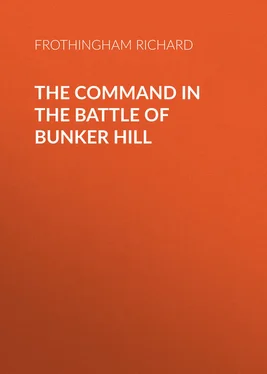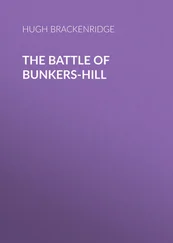6. Another mistake seems to astonish Mr Swett "by its magnitude, nay its sublimity." He says – "According to him, the great battle of Bunker Hill was fought, on our side, by a headless mob; and, to prove this, he adduces the most incontrovertible argument in the world, were it true, that the army at Cambridge, which had been for two months collecting and organizing under the able and experienced Gen. Ward, assisted by a host of accomplished veteran officers, was itself a mob," – p. 3. No quotation is made to sustain these remarks, and none can be made . Nothing to warrant it can be found in the book, and it is enough to stamp it as glaring misrepresentation. I hold no such opinion. I adduce no such argument. It may be cruel to annihilate so much "magnitude" and "sublimity," but I must state that they have no better basis than Mr Swett's imagination.
In opposition to this "mob" theory, Mr Swett goes to the other extreme, and affirms, p. 18 – "That the army at Cambridge was regularly organized and consolidated under Ward, Warren, Putnam, and other officers in regular gradation, without any distinction in regard to the colonies whence the troops came." And this is repeated on p. 21, and again on p. 29. In fact this constitutes the foundation of one of Mr Swett's "incontrovertible" proofs that Putnam was the commander. It is strange that Mr Swett should venture upon such assertions flatly in the face of the most positive evidence. He makes no attempt to disprove the facts, first brought together in the Siege of Boston, (pp. 98 to 104) relative to the action of the colonies, and which were drawn entirely from contemporary MSS. and authorities. It is not necessary to repeat them here. They show that each of the four colonies commissioned its troops, supplied them with provisions, directed their disposition, and that it was not until after the battle of Bunker Hill that the Committee of War of Connecticut ordered Generals Spencer and Putnam, while their troops were in Massachusetts, to obey General Ward as commander-in-chief, in order that there might be "a due subordination;" and also advised the colonies of Rhode Island and New Hampshire to do the same respecting their troops. That the army (June 17, 1775) was regularly organized and consolidated is not true.
The evidence in relation to the want of organization in the Massachusetts army is ample. This army certainly cannot be said to have been settled under officers in " regular gradation ." I have a report made to the provincial congress of Massachusetts, dated June 15, 1775, by a committee appointed "to consider the claims and pretensions of the colonels," which goes with much particularity into many cases, and recommends several to be commissioned, which was not done, however, until after the battle. On the 21st of June an important committee was raised "to inquire into the reason of the present want of discipline in the Massachusetts army, and to report to this congress what is the proper way to put said army into a proper regulation ;" and on the next day, the congress ordered the committee of safety to present lists of persons worthy to be commissioned, " that so our army may be organized as soon as possible ." The army regularly organized and consolidated! I beg Mr Swett will make himself acquainted with the facts, from authentic sources, before he writes again.
The old soldiers gave Mr Swett, when he prepared his history, better information than he writes in his last pamphlet. On page 11 (edition of 1826) he says: – "They (the troops) were strangers to discipline and almost to subordination . Though nominally organized into regiments, these were deficient in numbers, many of them only skeletons, and their respective ranks not ascertained . Some of the troops were yet serving as minute men, and the officers in a number of regiments were not yet commissioned ." Again, p. 14: The Americans "were unable to appreciate the necessity of discipline or to understand the unorganized state of the army in every department!!" But in 1850 the same writer has it that this same army was " regularly organized and consolidated
Конец ознакомительного фрагмента.
Текст предоставлен ООО «ЛитРес».
Прочитайте эту книгу целиком, купив полную легальную версию на ЛитРес.
Безопасно оплатить книгу можно банковской картой Visa, MasterCard, Maestro, со счета мобильного телефона, с платежного терминала, в салоне МТС или Связной, через PayPal, WebMoney, Яндекс.Деньги, QIWI Кошелек, бонусными картами или другим удобным Вам способом.
Mr Swett, on the publication of the Siege of Boston, favored me with the following note, which, in another note written subsequently to the publication of his pamphlet, he informed me was intended for publication. Under the present circumstances I hope to be excused for printing it: —
"Richard Frothingham, Jr., Esq., —
My dear Sir: For your history of the Siege of Boston I am very much obliged to you. Without time to have read it critically, I find it a remarkable monument of diligent and successful research, candor, impartiality and judgment. It is a very valuable addition to history. The subject of Bunker Hill battle I thought I had exhausted thirty years ago, but your additional information is interesting and important. We differ on one point only I believe worth mentioning, and that important only as a matter of curiosity, the commander in the battle, which we may discuss hereafter.
With friendly regard and respect,
With friendly regard and respect, S. Swett."












